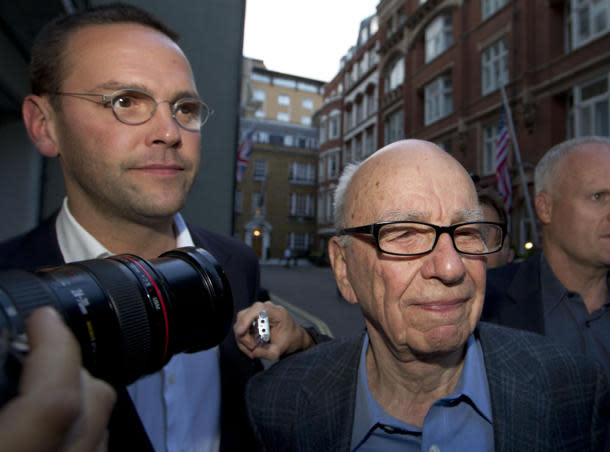 The Cutline
The CutlineNews Corp., Murdochs brace for contentious annual meeting

When News Corp. executives gather for their annual meeting in Los Angeles on Friday, things could be pretty contentious between the shareholders and executive suite.
Some shareholders, following the recommendation of Institutional Shareholder Services, an advisory firm and corporate governance watchdog group, are expected to withhold their votes from News Corp. directors now seeking re-election--including chairman Rupert Murdoch and his sons James and Lachlan.
The phone-hacking scandal that engulfed the company earlier this year "laid bare a striking lack of stewardship and failure of independence by a board whose inability to set a strong tone at the top about unethical business practices has now resulted in enormous costs--financial, legal, regulatory, reputational and opportunity--for the shareholders the board ostensibly serves," ISS said in a note last week.
But dissident shareholders may not be able to force boardroom change. Rupert Murdoch, News Corp.'s chief executive, owns approximately 40 percent of the voting shares, according to the Wall Street Journal. Saudi Prince Alwaleed bin Talal, who owns 7 percent, has publicly supported Murdoch during the scandal.
And despite questions about News Corp.'s executive leadership, the company's shares have jumped about 10 percent since the phone-hacking scandal broke in July--a positive performance that likely won't motivate "swing" shareholders to press for change.
Meanwhile, the New York Times asserted that "infighting" among the Murdoch clan, brought on by the phone hacking episode, is clouding News Corp.'s future:
The disclosure of widespread phone hacking at News Corporation's British newspaper division was only the latest and most serious episode to test a father-son relationship that has frayed over the last few years, leaving both [Rupert and James] at times not even on speaking terms.
Their disagreements, which were described in detail by more than half a dozen former and current company officials and others close to the Murdochs, stemmed in large part from the clashing visions of a young technocratic student of modern management and a traditionalist who rules by instinct and conviction. The tension grew worse as the gap between the New York headquarters and James's London operations, where he oversees the company's European and Asian holdings, proved difficult to bridge.
The elder Mr. Murdoch reached his boiling point last winter, said one of the former officials, and delivered a blunt ultimatum to his son.
"You're coming back to New York, or you're out."
James Murdoch complied with his father. Now, the younger Murdoch will have to wait until Friday to find out if the rest of News Corp.'s shareholders will keep him.
Other popular Yahoo! News stories:
• Too many 2012 debates? There were just as many four years ago
• The New York Times asks readers to review indie rock concerts on Twitter
• Gay ABC News anchor comes out on the air
